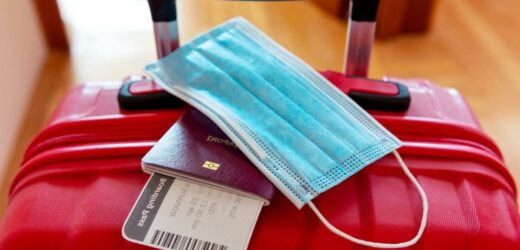Written by Amy Beecham
With Covid-19 cases rising once again, concerns about the freedom of travel in 2022 are being raised. We asked travel experts to weigh in with their best advice for holidaying abroad next year.
After so much uncertainty in 2021 caused by the Covid-19 pandemic, many of us have had our hopes pegged on 2022 being the year that we can escape abroad again, booking new trips as well as rescheduling any cancelled in previous years.
While travel restrictions have been slowly eased throughout the year, concerns about the Omicron variant have led to the reintroduction of some restrictions that could set a worrying precedent if cases continue to rise.
The prime minister has warned that the Omicron variant is “growing much faster” than the earlier Delta variant, and its doubling rate could be between two and three days.
This increase prompted the government to enforce “Covid Plan B” restrictions, which include a work from home order and mandatory face coverings and vaccine passports in certain settings. It also led to the the to reinforcement of rules on entering and leaving the UK, including a reformed “red list” of countries that cannot currently be traveled to without mandatory quarantine.
However, this doesn’t mean travel is impossible, just that there are a few more things to be aware of.
To make things a little easier, we reached out to travel experts to find out more about the things you need to keep in mind when deciding whether or not to book a holiday for 2022. Here’s what they had to say.
“There are lots of new considerations for holidaymakers, with words and phrases that simply weren’t in our lexicon pre-pandemic, like: travel corridors, quarantine, as well as new considerations for travel, such as PCR tests and digital health passes,” Skyscanner’s consumer travel rights expert tells Stylist.
“And while the travel checklist for getting away looks quite different to pre-Covid times, our travellers have shown they are willing to adapt to changing requirements in order to be able get away safely, with thousands of people successfully enjoying those all-important breaks away again within the rules.
“We’ve also seen travel providers reacting quickly to the rapidly changing climate with flexible booking policies, increased insurance and competitively low prices set to continue into 2022.”
What are the current UK travel restrictions?
In light of the rising cases, testing requirements have already tightened for those coming in to the country. All travellers to the UK, regardless of vaccination status, must take a PCR test within two days of arrival and isolate until they get a negative result. From 7 December 2021, all England-bound passengers must present a negative Covid test (either lateral flow or PCR) taken within 48 hours of departure. Free NHS lateral flow tests are not valid for this purpose.
However, for outgoing travellers, 11 countries are on the UK’s revived red list: Angola, South Africa, Botswana, Eswatini (formerly Swaziland), Lesotho, Mozambique, Malawi, Zambia, Namibia, Zimbabwe and Nigeria. Others in the region or beyond could still be added at short notice, but for the moment the vast majority of countries present no great barriers to travel.
As many countries have different requirements, the UK government advises checking foreign travel advice for all countries you will visit or travel through, including rules on social distancing, mask wearing, vaccine passports and quarantining.
You must also arrange any Covid-19 tests you will need to enter the countries that you intend to travel to ahead of your trip.
“The price of Covid tests required for travel can vary hugely, from about £35 to £200+, so factor these costs into your holiday budget,” shares Oli Townsend of MoneySavingExpert. “As we’ve seen recently, the rules can change quickly, and you could end up needing tests you weren’t expecting. It’s crucial to also check the rules and tests required for the destination you’re travelling to.”
“As well as the price, check test provider reviews and results turnaround time. You often pay more for faster results, so there’s a trade-off between cost and the time you may need to self-isolate. For day-two PCR tests for example, home testing kits are generally cheapest, but results may take longer as you need to send or drop off your sample which will add time. Taking your test at an airport clinic is safest for speed as you can get tested immediately on arrival, but this tends to be the priciest option.”
Will I need to be vaccinated to travel in 2022?
It’s important to bear in mind that you’ll need to be fully vaccinated to get into many destinations, to enjoy a less restricted holiday and to avoid quarantine on return to the UK.
Covid passes issued in the UK can be used throughout the EU to show proof of vaccination – either digitally, or as a printed download (as long as it is dated later than 1 November 2021).
According to government guidance, if you have not been fully vaccinated, you should continue to follow the entry requirements of the country you are travelling to, such as proof of a negative Covid-19 test on arrival. You should carefully research the requirements of your destination country before travelling.
Should I book a holiday for 2022?
“Check for bookings that offer flexibility, as this is a form of self-insurance while travel restrictions remain uncertain,” advises Townsend. “You might want to look for holidays where you have no-quibble rights to change dates or cancel for a refund or voucher without charge.
“Don’t assume flights will be cancelled, even if people are effectively banned from travel. Many airlines are offering free date changes, some almost up to the last minute – though you will have to pay the difference if you move to a more expensive flight,” he explains.
“Package holidays – where you have your flights and hotels in one booking – can often be cheaper than booking separately, but they also offer some handy extra protection. Under the Package Travel Regulations, you’re legally due a refund if the travel agent, firm, airline, hotel or car firm goes bust or because your destination has closed its borders to Brits.”
“For any travellers looking to book future travel we always recommend selecting a flexible ticket where possible to give you extra peace of mind in case of any changes,” agrees Skyscanner’s expert.
“It’s key to purchase a travel insurance policy that suits your needs; there are policies which have been designed for post-coronavirus travel and can cater for last-minute changes – but it’s really important to read the small print in advance. And while travel restrictions are still in flux, its more important than ever to check the latest travel advice for testing and self-isolation requirements before travelling out and returning back to the UK. Skyscanner’s handy Covid travel map uses straightforward visuals to show the current travel guidance at home and abroad, with different views depending on traveller vaccination status, as well as dedicated advice pages to help make sense of the latest changes.”
What should I do if I’ve already booked a trip for 2022?
Currently, the government has continued to stress that there is no need to cancel plans such as Christmas parties and nativities, so you equally don’t need to start axeing your 2022 holiday plans yet either.
However, there are other measures you can and should take to protect yourself, physically and financially, in case of any further Covid developments.
The government advises regularly checking the UK Foreign Office website for entry requirements of any other countries you visit as these can change quickly.
Townsend also stresses that travel insurance is “still vital,” and that you should get it as soon as you’ve booked.
“One of the main reasons to get it is to protect you from unexpected eventualities before you go. Travel insurance doesn’t cover all Covid eventualities (you won’t be covered if you don’t go ahead with your trip because you’d have to quarantine on return, for example), but it’s still important, especially if you’re ill while away. You’ll also be covered for a multitude of other non-Covid risks such as theft or bereavement.”
Where can I go for the most up to date travel information?
All up-to-date foreign travel advice, broken down by country, can be found on the government’s website. It also publishes and regularly updates its list of red countries and territories.
There are also resources to find out how you can use the NHS Covid Pass to prove your vaccination status abroad, as well as check what you will need to do when you return to England after travelling.
Not sure whether travelling abroad is right for you? Check out our UK staycation guides to get some home travel inspiration.
Speak to a financial adviser registered with the Financial Conduct Authority before taking any financial advice, and think carefully before making any decision.
Images: Getty
Source: Read Full Article


